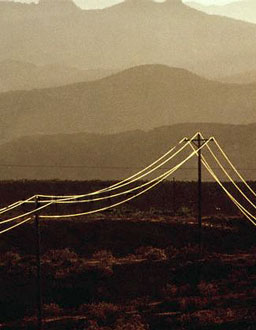|
|
|
The Issue
In 1963, Microwave Communications, Inc. (MCI) was organized in Joliet, Illinois, to provide a customized microwave communications network for trucking companies and other small businesses between Chicago and St. Louis. During the decade that followed, MCI realized that its new technology could bring high quality long distance telephone service to the consumer market at a price that was lower than AT&T’s.
MCI had a great idea and the technology to implement it, but AT&T had a monopoly on long distance service that prevented MCI from bringing its new service to consumers. As a result of legal challenges by MCI and the federal government, AT&T’s monopoly on long distance was broken and competition was allowed in the long distance marketplace.
But the struggle for the right to compete continues in other areas of newly emerging technologies such as Internet access, multimedia satellite services, integrated long distance, cellular paging, and “One Number” technology. |
|
|
|
|
|
|
|
The Materials
We decided on a “fun” approach in an effort to get more non-activists involved in MCI-TEXPAC. Conceptual work centered around the “Baby Bell” nickname and ideas based on babies and phones were created. Two concepts were presented to MCI executives and they chose an image depicting a “Baby Bell” tugging at a phone, refusing to share it.
The image was incorporated into posters with the slogan “Help MCI Teach Texas’ Baby Bell How to Share.” Brochures were created to give more information about the PAC’s mission and how employees could directly benefit from participation.
To build The MCI-TEXPAC Brochure and Poster image we utilized a vintage stock photo of a baby fighting with his mother over a glass of milk. We replaced the glass of milk with a vintage phone handset, colorized the black and white image, gave it a sepia tone, and added the embroidered letters “SWB” to the front of the baby’s outfit. Customized versions of the brochure and poster were created for and distributed to each MCI facility in Texas. |
|
|
The Results
As a result of the contest, employee participation in the PAC increased tenfold in just 30 days. The additional resources injected into the PAC enabled it to support candidates that understood MCI's views on communications issues and enhanced MCI's presence at the Capitol during the next legislative session.
Spurred on by MCI-TEXPAC's efforts to contribute more to legislators supporting competition, MCI continues progress in the battle for the right to bring new and innovative technologies and levels of integration to Texas consumers. |
|
|
|
|
Status & Goals
The continuing battle for MCI’s right to compete is being fought in Washington and in state legislatures all across the US. MCI’s good strong argument for allowing competition is backed up by its track record of increasing quality and decreasing costs. To better its chances, MCI needed a way to build and enhance relationships with key legislators and to help communicate the benefits of increasing competition.
MCI-TEXPAC was formed in the mid-1980s for just that purpose. But after ten years, the PAC had been neglected and its contributions to candidates were dwarfed by those of MCI's competitors.
In the spring of 1997, John Doner & Associates met with MCI executives to discuss ways to reverse that trend and pump new life into MCI-TEXPAC. MCI agreed to award us the contract if its goals could be accomplished within 30 days. We agreed. |
|
The Solution
A decision was made to implement a company-wide fundraising initiative that would capitalize on the competitive spirit of MCI and its employees. A contest was devised to pit sales offices from around the state against each other to see which office could most increase PAC participation within the 30-day period.
For the contest to succeed in getting new members to sign up, awareness of the PAC and its goals had to be rapidly raised among the employees. And most importantly, they needed to understand how this important tool could result in new technologies to sell to existing customers and to help attract new customers.
MCI's main competitor in the legislative arena was a direct descendent of the same AT&T that MCI's founders had first challenged over 20 years earlier, Southwestern Bell. It was decided that Bell's adversarial position toward MCI could be used to the PAC’s advantage in this campaign to recruit new members. |
|
|
|


